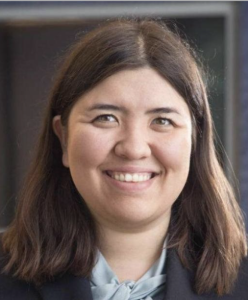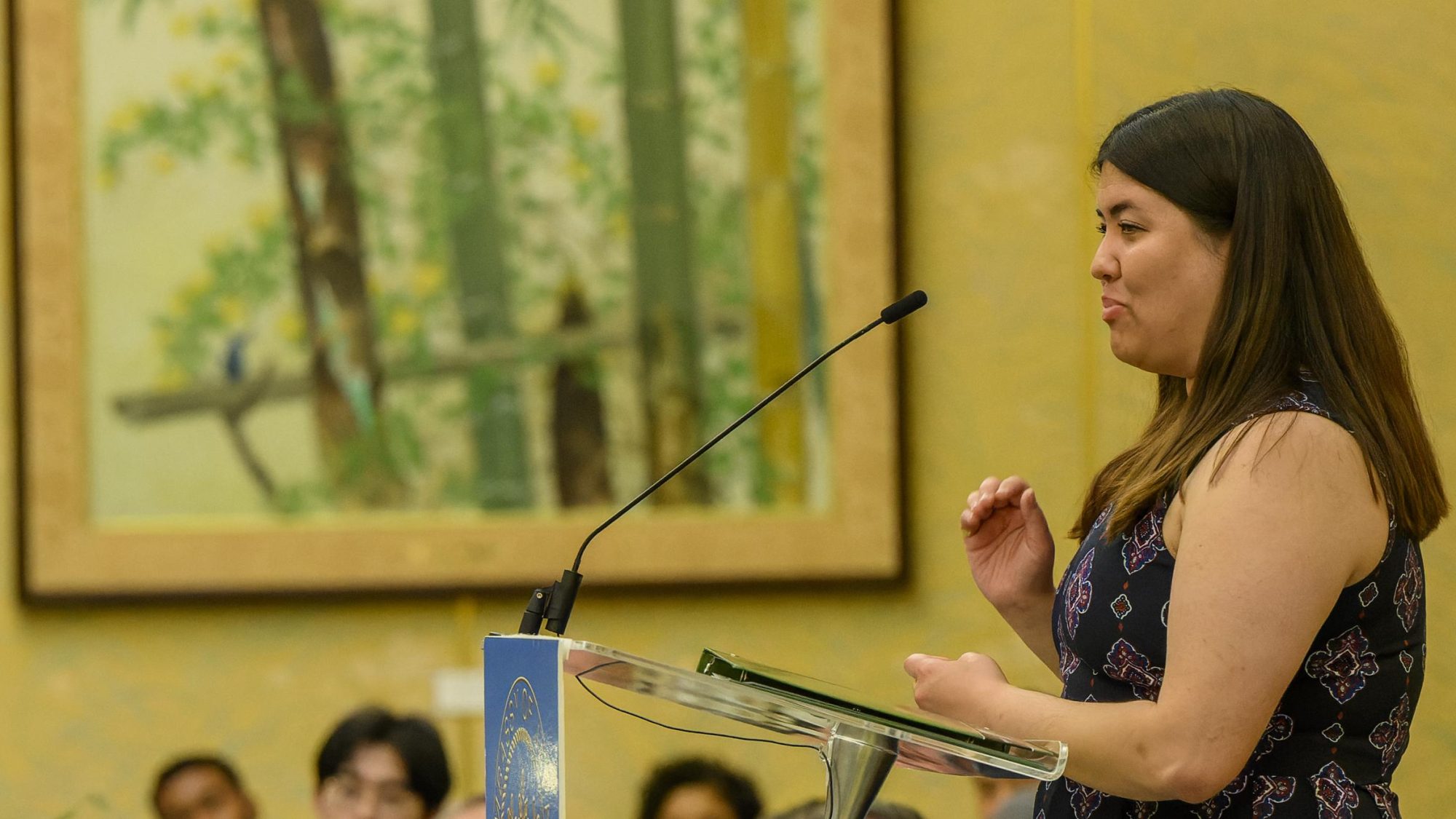
What year did you graduate and what was your area of concentration?
I graduated from MASIA in May 2022, and I concentrated in Politics and Security.
Please tell us about yourself. What led to your interest in Asian Studies?
I’m originally from South Bend, Indiana, but I lived in Japan for part of my childhood because my mom is from Japan. I attended a Japanese preschool and elementary school in the Tokyo metropolitan area and spoke both English and Japanese at home. While I lived in Japan, there was widespread media coverage about the Japanese government’s diplomatic gestures towards North Korea, and their success in negotiating the repatriation of five Japanese citizens who were abducted by North Korea between the late 1970s and early 1980s. This left a profound impression on me, and in retrospect, it was an inflection point that led to the beginning of my interest in Asian Studies and international relations more broadly.
For the longest time, my intellectual curiosity was oriented towards classical antiquity, the early Medieval times and the Renaissance era in Europe. Now, it’s more of a hobby that comes to life, especially whenever I surround myself with otherworldly masterpieces at art museums. I graduated from a small liberal arts school called Saint Mary’s College, which is right across the street from the University of Notre Dame. As a history major, I primarily chose my coursework based on my interest in European history. Starting my junior year, I took Japanese language and literature courses at Notre Dame because I thought that that would be the easiest way to force myself to improve my reading and writing, as well as appreciating my Japanese heritage by engaging with Asia-oriented student clubs. To top it off, I had to write a capstone thesis my senior year, and it only took me minutes to decide that I wanted to center my research on the Japanese abduction issue.
After I graduated, one thing I knew was that I love working in an academic environment and global affairs. That’s why I decided to pursue a job at a university, where I helped international students and scholars navigate admission processes and comply with immigration regulations. What made my time there truly invigorating was that the world was coming to the campus, and I concentrated my energies on understanding the ever changing geopolitical landscape. Given my Japanese heritage and my interest in the abduction issue, I devoted more time to conduct research on Japanese foreign policy and North Korean affairs. But perhaps most importantly, as someone based outside of Washington DC at the time, I became more determined to engage with the foreign policy discourse, which is why I began publishing articles on what is now known as the Indo-Pacific region.
Looking back, one of the byproducts of my writings is that it propelled my interest in regularly exchanging ideas about Asian Studies in a multidisciplinary environment. After meeting some erudite scholars and practitioners from the Asia policy space – some of whom are now good friends of mine – I was convinced that pursuing grad school was the best course of action, and that’s how I discovered MASIA. And the rest is history, as they say.
What was your time like in MASIA?
When I applied to grad school in fall 2019, I thought that it was a given that I’d be able to attend classes in person and enjoy exhilarating conversations with my professors and classmates. By the time I got into MASIA, COVID-19 was declared a global pandemic and life as we knew it had changed dramatically. Despite the myriad of uncertainties regarding the modality of classes for the 2020-2021 academic year, I told myself that I was meant for this challenge of pursuing MASIA during a time that was considered the height of the pandemic. One of the silver linings of taking classes remotely was that I had a bit more time to pursue certain things – one of which was writing. Outside of classes, I wrote articles as a quiet way to deal with the unique challenges of being a virtual student and it was also my personal way of maximizing my time as a MASIA student, even though that wasn’t a requirement of the program. My writing was a way for me to remain engaged in the foreign policy discourse, and the curiosity that undergirds it is also my way of digesting what I’ve learned in the classroom. During my first semester at MASIA, I also had the opportunity to moderate two MASIA webinars. One was on the evolution of the U.S.-China strategic competition since Xi Jinping’s rise and the other was on forecasting what U.S.-Taiwan relations will look like after the U.S. presidential election in November 2020.
While taking classes, I also pursued multiple employment opportunities, both on and off campus. During my first semester at MASIA, there was a new joint initiative between the U.S.-China Dialogue on Global Issues and the Asian Studies Program, and I remember Dr. Green informed us about an opportunity to become a Research Assistant for what sounded like an exciting project on strategic dialogues in Asia. I told myself that it was a no-brainer that I should apply, and was thankfully offered the position. I helped put together a virtual roundtable on Japan and China relations within the broader context of the U.S.’ strategic competition with China, and I was able to create a write-up that recalled some of the main takeaways from each of the speakers’ talking points and the Q&A session that followed. I also worked at the Institute for the Study of Diplomacy for well over a year and had greater exposure to how diplomatic statecraft can play a role in addressing transnational issues like food insecurity, kleptocracy, among other things. I also completed an internship at CSIS’ Japan Chair, albeit virtually, and I really enjoyed keeping abreast of political and geoeconomics developments in Japan, as well as periodically writing policy memos for some of my colleagues. In their own ways, each of these positions showed me the importance of cultivating event management skills, being able to work collaboratively with others, and how to effectively manage competing priorities.
My experience as a MASIA student changed a lot once I relocated to the DC area in summer 2021. I was especially determined to be on campus as much as I could and attend events in person, particularly those put together by the School of Foreign Service and MASIA. But sometimes, obstacles stood in the way. For example, with COVID-19 procedures such as social distancing strongly enforced on campus, there were a few times when I couldn’t attend events because the venue was already at maximum capacity. As a result, I quickly learned that I had to be a bit more creative with regard to how to be involved with campus activities (even if they weren’t germane to Asian Studies). That’s why I decided to be a test proctor for MBA students at the McDonough School of Business and became a student consultant for Georgetown’s Honor Council. There were times when I thought that I was overstretching my bandwidth, but at the end of the day, I’d rather look back at my time at MASIA, knowing that I did the best that I could to reap the benefits that the program and the Georgetown community had to offer.
What specific skills and knowledge did you gain from Asian Studies courses at Georgetown?
I learned a lot while at MASIA, but a few really stick out to me. First, I learned the importance of having versatility in my writings. Each of my professors have different expectations of my writing products for class. On a more granular level, there were times where I had to formulate my thoughts and arguments with brevity and other instances where I had to apply my critical thinking skills for more longer-form papers.
MASIA also gave me ample opportunities to work on group projects and presentations. As a history major during my undergraduate years, I was more accustomed to working on my own. My classmates have different real-world experiences and expertise on Asia, and whenever I worked on group projects, it was amazing to see how our unique insights translated into one cohesive and compelling product.
Where has life taken you after MASIA?
After I graduated in 2022, I interned at the Asia Society Policy Institute for a few months before starting a new position as a Defense Analyst at The Asia Group (TAG), a strategic consulting firm headquartered in DC. I also made my first trip to Australia in November 2022 by participating in a symposium on the Quad that took place at La Trobe University in Melbourne and became a member of the Australian American Leadership Dialogue’s Young Leadership Dialogue shortly thereafter.
I left TAG at the end of May 2023 and recently started my current job at the Center for Strategic and Budgetary Assessments (CSBA), which is a think tank in Washington, DC that conducts comprehensive research on defense and national security issues for the U.S. and like-minded countries. A few weeks before I began my current job at CSBA, I began a year-long fellowship as an inaugural member of the Australian Institute of International Affairs (AIIA) and The Japan Foundation’s Indo-Pacific Cooperation Network. The purpose of this program is to bring together 15 individuals from around the Indo-Pacific who are interested in producing research on social and/or policy-related aspects of natural disasters. It’s quite clear that the organizers and the other delegates of this fellowship are not only passionate about their respective lines of work, but they’re all genuinely kind people that I’m very fortunate to have met through this program.
What did MASIA mean to you?
For me, MASIA was my anchor, and it still is in many ways. It’s a close-knit community that I will forever cherish, and I’ve made some great friends through the program. I wouldn’t be where I am today without the guidance of some wonderful MASIA professors and alums who’ve helped me through a multitude of things such as what classes to take, the job searching process, exploring new research interests and so much more.
What advice would you give to prospective/current students in the Asian Studies Program?
First, it’s important to step outside of your comfort zone, which can be incredibly daunting depending on the situation. Whether it’s applying for an employment opportunity even if you don’t think you’re qualified, cold messaging someone you don’t know, or asking a question during the Q&A session of an event, I think it’s important to earnestly put yourself out there if you want to truly thrive in grad school. Speaking from personal experience, asking questions has further energized my intellectual curiosity and it’s even led to befriending others who also share similar academic and/or professional interests as myself.
Second, there’s nothing wrong with pursuing an extracurricular activity and/or internship during your time at MASIA and then realizing that it’s not something that aligns with your professional and/or personal interests. Grad school is not just about building on your interests and your lived experiences; it’s also meant to be a time of exploration and discovery.
Third, reach out to your professors. They may be incredibly busy with packed schedules, but there is a reason why they are part of the MASIA community. They want to see you succeed and their respective curriculums are grounded on cura personalis. To this day, I’m eternally grateful to some of my former professors that I’ve grown close to, including my faculty adviser, for encouraging me to do my best in my work and other causes that I care deeply about.
And finally, reach out to us alums! We were once in your shoes, so please reach out if you think we can help you in any way to make your time at MASIA a truly rewarding experience.
